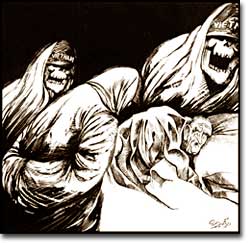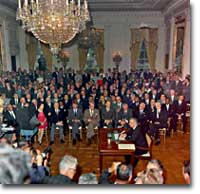


This 1968 political cartoon captures the struggle of Lyndon B. Johnson's time as President. While Johnson dreamed of a "Great Society," his presidency was haunted by the specter of Vietnam. Much of the funding he hoped to spend on social reforms went towards war in southeast Asia.
Lyndon Baines Johnson moved quickly to establish himself in the office of the Presidency. Despite his conservative voting record in the Senate, Johnson soon reacquainted himself with his liberal roots. LBJ sponsored the largest reform agenda since Roosevelt's New Deal.
The aftershock of Kennedy's assassination provided a climate for Johnson to complete the unfinished work of JFK's New Frontier. He had eleven months before the election of 1964 to prove to American voters that he deserved a chance to be President in his own right.
Two very important pieces of legislation were passed. First, the Civil Rights Bill that JFK promised to sign was passed into law. The Civil Rights Act banned discrimination based on race and gender in employment and ending segregation in all public facilities.

Republican Barry Goldwater attempted to unseat Lyndon Johnson in the 1964 election but was soundly defeated. This bumper sticker combines the chemical symbols for "gold" (Au) and "water" (H 2 0) to create a whimsical and memorable campaign slogan.
Johnson also signed the omnibus Economic Opportunity Act of 1964 . The law created the Office of Economic Opportunity aimed at attacking the roots of American poverty. A Job Corps was established to provide valuable vocational training.
Head Start, a preschool program designed to help disadvantaged students arrive at kindergarten ready to learn was put into place. The Volunteers in Service to America (VISTA) was set up as a domestic Peace Corps. Schools in impoverished American regions would now receive volunteer teaching attention. Federal funds were sent to struggling communities to attack unemployment and illiteracy.
As he campaigned in 1964, Johnson declared a "war on poverty." He challenged Americans to build a "Great Society" that eliminated the troubles of the poor. Johnson won a decisive victory over his archconservative Republican opponent Barry Goldwater of Arizona.
American liberalism was at high tide under President Johnson.

The Civil Rights Act of 1964 was part of Lyndon B. Johnson's "Great Society" reform package — the largest social improvement agenda by a President since FDR's "New Deal." Here, Johnson signs the Civil Rights Act into law before a large audience at the White House.
Johnson was an accomplished legislator and used his connections in Congress and forceful personality to pass his agenda.
By 1966, Johnson was pleased with the progress he had made. But soon events in Southeast Asia began to overshadow his domestic achievements. Funds he had envisioned to fight his war on poverty were now diverted to the war in Vietnam. He found himself maligned by conservatives for his domestic policies and by liberals for his hawkish stance on Vietnam.
By 1968, his hopes of leaving a legacy of domestic reform were in serious jeopardy.
Voting Rights
The Civil Rights Division of the Department of Justice puts the evolution of voting rights in perspective with a four part site that includes the history of the violent and bloody struggle that spanned almost a century as states undermined the ability of blacks to vote. See how the Voting Rights Act of 1965 added teeth to the 15th Amendment of 1870 that gave blacks the right to vote. Don't miss the charts in the last segment, which show the incredible effects of racially divisive tactics and intimidation of the 1870's, and the incredible gains that were realized after the historical Voting Rights Act of 1965.
The War on Poverty
Get the text of President Lyndon Johnson's special message to congress that declares a nationwide war on poverty that is embodied in the Economic Opportunity Act of 1964. See how the president boldly tries to convince Congress and the nation to "pursue victory over the most ancient of mankind's enemies."
Lyndon Baines Johnson Library and Museum
The Lyndon Baines Johnson Library is a phenomenal resources for all things LBJ. Explore this repository of presidential records and memorobilia to see what life in Johnson's White House involved. The oral history section, containing interviews with Johnson's personal staff as well as diplomats and political allies are a must-read. For more information on Johnson's first domestic policy push, read the transcripts of phone conversations from 1965, only released to the public in 2001. Audio clips are also available of some conversations are also available.